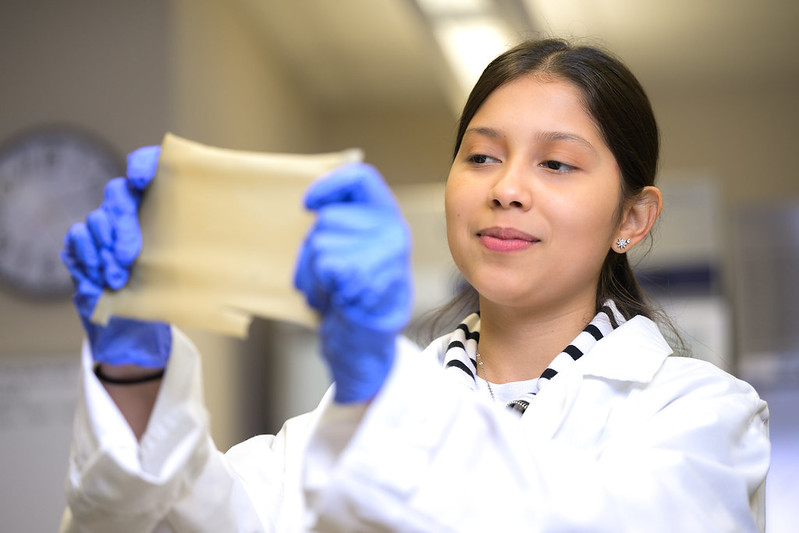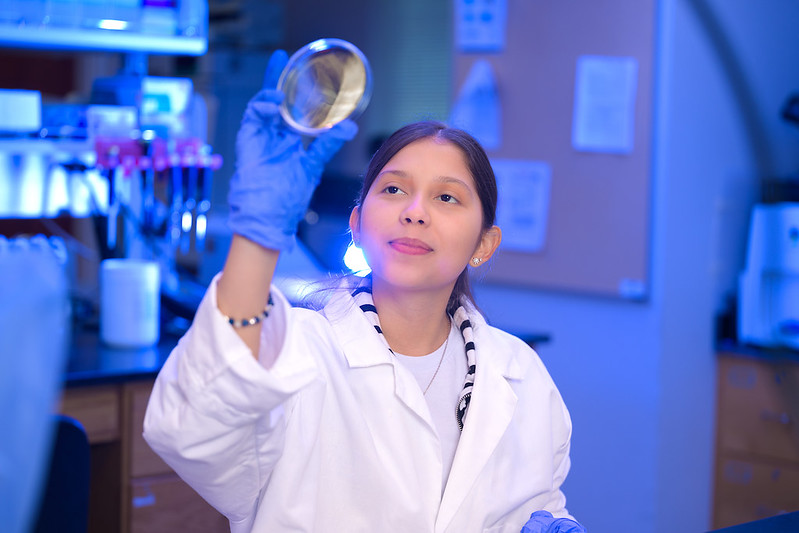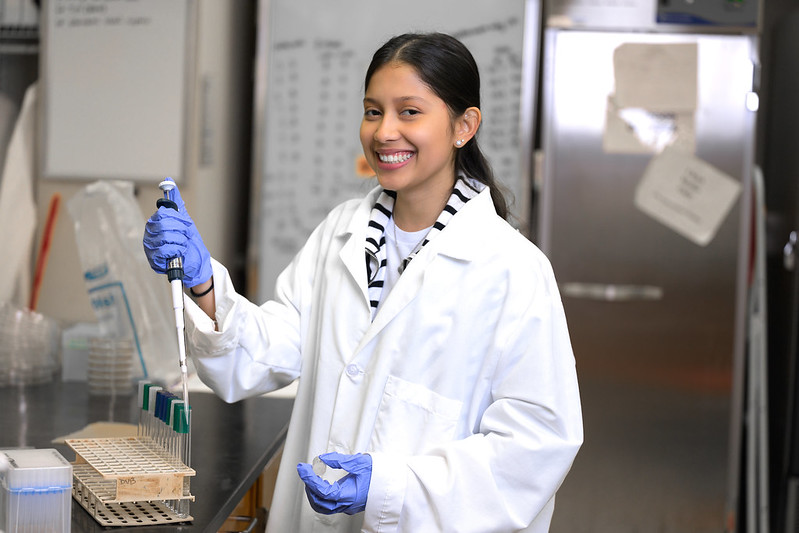Auburn University graduate student finds passion for food science, Listeria prevention
Article body
Katherine Sierra, an Auburn University master’s student in food science, has won multiple awards that hinge on her public speaking ability, including a third-place award for her poster presentation at the 2023 Student Research Symposium.
These are impressive awards for any scientist in training, but even more of a feat considering Sierra became fluent in English only two years ago after moving to Auburn from Honduras for an internship in the Sensory Science and Consumer Research program.
When trying to learn a new language, many people might watch popular television shows or read fiction. But Sierra had a strategy only a scientist would devise.
“I read peer-reviewed papers,” she said.
When Sierra encountered the inevitable difficulty that comes with acquiring scientific terminology in a new language, she reached out to one her mentors, Amit Morey, associate professor in the Department of Poultry Science, for encouragement.
“Dr. Morey helped me and said, ‘You are a good student. You will learn. You are smart and you will learn,’” Sierra said.
Learning English was just the start of Sierra’s journey at Auburn.
After completing her internship, she joined Morey’s research group and began her graduate studies, and she has soared. Sierra received the prestigious National Protein and Food Distributors Association Foundation Scholarship and is chipping away at her research focused on developing innovative technologies to improve food safety.
Morey describes Sierra — and many of his mentees — as “out-of-the-box thinkers” who have the potential to make a positive change in the field.
“She is doing cutting-edge research that’s going to impact food safety and quality,” he said.
An unexpected fascination with food science
Growing up, Sierra said she never would have predicted she would become a scientist. It wasn’t until she enrolled in food science classes at Zamorano University while pursuing her bachelor’s degree that she realized science could help explain questions she pondered about the world around her.
“Every day, I cook all of these things, but I don’t know the chemistry and the science behind it,” she said.
Through her coursework, Sierra gained the tools to translate the food world’s jargon, from dissecting the backs of food labels to gaining fun facts. For example, she was thrilled to discover that part of the egg turns white because of how the protein reacts to heat.
“My brain was exploding,” she said with a laugh.
Committed to pursuing her passion for food science for her career, Sierra’s next step was an internship. She perused a list of universities, and Auburn caught her eye. “I saw Auburn is one of the best universities in the U.S., and it had a top program in poultry,” she said.
Sierra jumped at the opportunity to apply. Once accepted, she began researching a variety of food products, including sugar replacements in ice cream, with Sungeun Cho, assistant professor in the Department of Poultry Science.
At around the same time, Morey noticed Sierra’s affinity for science and encouraged her — both as a young scientist and a person.
“I understand what it means to be an international student, what it means to learn a new language and adapt to a new system of communication,” said Morey, an Auburn College of Agriculture alumnus. “Being patient with these students is the key to helping them grow.”
How plasma may help prevent harmful bacteria
Morey and Sierra are currently investigating how to reduce a disease-causing bacterium, Listeria monocytogenes, which is associated with ready-to-eat meats. It is an important scientific pursuit because infections caused by Listeria monocytogenes, known as Listeria, can be fatal. People who are immunocompromised, older or pregnant are especially susceptible, Sierra said.
Listeria monocytogenes can live on a variety of surfaces in processing plants and then contaminate the food. To help address this issue, Morey and Sierra are conducting research with the goal of removing these bacteria from common surfaces.
Current industry approaches to eliminate Listeria monocytogenes from common surfaces include thorough cleaning and sanitation with chemicals — which can be costly and less sustainable, Morey said. Sierra is part of two studies within Morey’s lab that are looking at alternative tactics.
They are investigating a plasma-based strategy that could be more sustainable than existing approaches. While “plasma” may sound complex, Sierra shares its simple definition, showcasing her science communication strength.
“Plasma is the fourth state of matter, so we have gas, liquid and solids,” she said. “You often don’t learn about plasma as one of the states of matter.”
But this sometimes-forgotten state of matter is an important one; plasma has the potential to reduce Listeria monocytogenes that can live on food processing surfaces and even on ready-to-eat food products.
In a nutshell, when power is applied to everyday gases, scientists can create plasma. This plasma contains charged atoms, known as free radicals, that are ready to react.
“These atoms can penetrate the cell wall of the bacteria, in this case Listeria, and can damage its DNA,” she said.
For future studies, they are investigating whether this plasma-based technology is effective over the long term and its effects on how the bacterium functions. The scientists are currently conducting additional experiments in preparation for publishing this work.
Meanwhile, Sierra is working to complete her master’s thesis about using a biodegradable film made from chicken gelatin to wrap cooked chicken with the goal of preventing Listeria monocytogenes.
While working on her degree, Sierra said there are sometimes long weekends and nights, but that being a part of Morey’s tight-knit team keeps her motivated. She said Auburn is exactly where she wants to be while growing into her own as a scientist.
Through her graduate program in agriculture, she has had the opportunity to travel to conferences, engage in top-notch research and receive impactful mentorship.
“These are opportunities I never imagined I’d have,” she said.
What’s next for Sierra? She hopes to pursue her doctorate. Morey is right in her corner, and he has confidence she has the foundation to succeed at Auburn and beyond.
“She’s very focused, a great problem-solver, forward thinker and highly disciplined,” he said. “These are great characteristics that a future scientist or industry professional should have, and these will help her excel anywhere she goes.”
Related Media
Media interested in this story can contact Communications Director Preston Sparks at (334) 844-9999 or preston.sparks@auburn.edu.
Auburn University is a nationally ranked land grant institution recognized for its commitment to world-class scholarship, interdisciplinary research with an elite, top-tier Carnegie R1 classification, life-changing outreach with Carnegie’s Community Engagement designation and an undergraduate education experience second to none. Auburn is home to more than 30,000 students, and its faculty and research partners collaborate to develop and deliver meaningful scholarship, science and technology-based advancements that meet pressing regional, national and global needs. Auburn’s commitment to active student engagement, professional success and public/private partnership drives a growing reputation for outreach and extension that delivers broad economic, health and societal impact.







